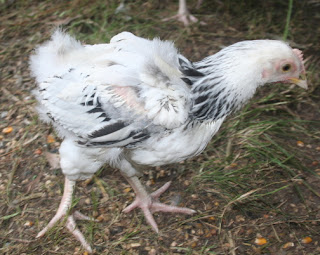Just an update on those strange half-feathered light sussex show birds...
They're about 3 days short of 8 weeks old, and still on the ground in a tractor. I've just moved them to a new position after nearly 2 weeks in the same spot. Yes, I know, that's terribly lazy. In that time there have been numerous light rain showers, so the ground under the exposed front half of the tractor has certainly been dampened several times. I haven't seen even the slightest case of coccidiosis despite that the birds are eating only a home made mix of wheat, corn and pea sprouts, sunflower seeds, lupins, alfalfa, meat meal, yeast, molasses and seaweed meal. They also get some grass, and two or three times a week I make up a mixture of bandsaw dust (from a butcher), oatmeal and kefir.
Now it may be helping in my situation that our soil is very sandy. This drains very well and would tend to destroy coccidiosis more quickly than heavy clay soils. And the tractor is also sitting under large pine trees that drop needles and sap onto the ground (pine sap is a known biocide). But still, it does seem that the combination of frequent probiotics (kefir), soured milk and a wide variety of foods has made a difference to the chance of coccidiosis. Maybe the day one exposure to a tiny amount of adult hen droppings (in the water/probiotic mix) might have been the key.
Remember also that I've had adult birds bought at point of lay suddenly develop severe coccidiosis when put into one of my pens... (I figured they must have been raised to adult age on wire, with no exposure to soil pathogens.) Coccidia are certainly alive at my place, even in areas with pine trees.
Really it seems to boil down to the probiotics and early exposure to small cocci numbers, gradually increasing over time.
When I bought these light sussex I saw numerous growers with clear coccidiosis signs (drooping wings, hunched posture). The breeder relies 100% on coccidiostats along with raising on wire in the first instance, then he gives his growing chicks limited periods of time on free range. Clearly the coccidiostats aren't working even when range periods are kept short. The numbers in the soil must be too high.
It seems possible to me that he has several unfortunate events happening:
1. Coccidiostat resistance among the pathogens. Put simply, the medications in the feed no longer work on his particular strain of coccidia, because the pathogens have been bred to be immune.
2. An overabundance of coccidia in the soil because of the removal (via coccidiostats) of any competing organisms such as protozoa that may feed on coccidia... Just a possibility and I'm only a layperson, so don't quote me! But still, it could partly explain the massive coccidiosis problem.
3. Each chick that he puts down on the ground has imbalanced intestinal flora. Due to lack of competition from other organisms, coccidia flourish in his birds' guts and are therefore shed much more heavily into the soil. The cycle escalates.
4. Of course it seems obvious: he raises too many young birds on the same ground.
Now I hope I'm not picking on a breeder... I felt his husbandry was terrific and his adult birds all looked fabulous. It's just interesting to compare situations, as a reminder that either I've been very lucky this time around, or I've found a way to wean birds away from medications in favour of natural cocidiosis control. Obviously I hope it's the latter but of course I could come a complete cropper in six months or a year!
I hope not — and I'll be moving the grow-out tractor to a new position (albeit one that has had growers on it before, but not very recently) when I next raise chicks. In fact I'll be taking all the precautions I've talked about here, such as moving chicks out of the initial brooder by the 3rd week, giving kefir and a wide range of feeds, and moving them as frequently as I can once in the tractor. The next big challenge will be 25 meat chicks I'm buying shortly to raise organically for myself and a friend (who is into organics but can't put the time into growing birds). Being such fast growers with so many health challenges anyway, raising meat hybrids off medication and using the sprout diet will be an interesting experiment, and things on the cocci front could easily go very wrong given the high volume of feed/droppings passing through each bird. So I'll need to be very cautious with my practices.
Meanwhile I've got 8 week old chicks on damp ground that has raised chicks before (albeit in low numbers), without medications. That's got to be worth a smile! :-)




1 comment:
Yes it is a good news that without any medicines there is such improvement in the health of that chick.
Post a Comment